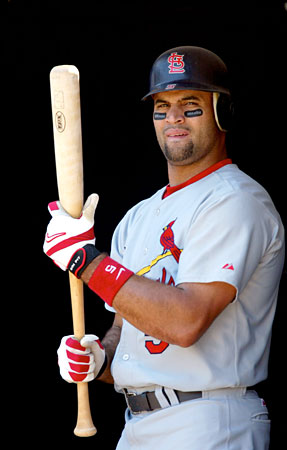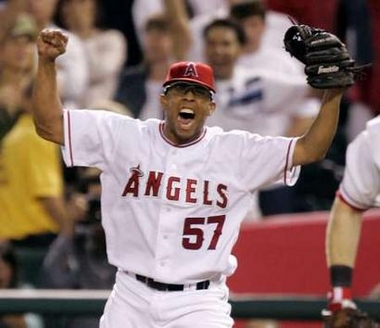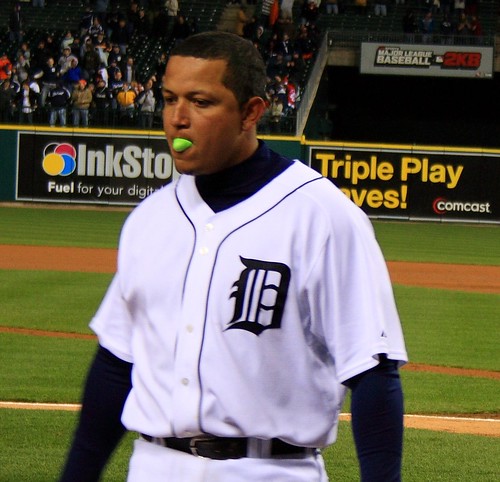Pujols Wins MVP
First off, I would like to thank you for an informative post. The debate about who would win the NL MVP award was
 heating up towards the end of the season and, to be honest, it really seemed like Ryan Howard was going to win it because of his huge late-season numbers and the fact that his team won the division (NL East) and was going to the playoffs for a second straight year. I know that Howard's numbers were not all pretty, especially his .251 batting average and his 199 strikeouts. But, nonetheless, he still led the majors with 48 home runs and 146 RBI. Also, as I mentioned before, it almost seemed like Howard single handedly carried his team through much of August and September, coming up with huge hits almost every game. The combination of his power numbers, his September surge and his team making the playoffs, I feared MVP voters might give too much significance to any particular statistical category or the fact that his team had a chance to play on into October. It seems my fears were unwarranted, however, as Albert Pujols (pictured to the left) won the NL MVP award.
heating up towards the end of the season and, to be honest, it really seemed like Ryan Howard was going to win it because of his huge late-season numbers and the fact that his team won the division (NL East) and was going to the playoffs for a second straight year. I know that Howard's numbers were not all pretty, especially his .251 batting average and his 199 strikeouts. But, nonetheless, he still led the majors with 48 home runs and 146 RBI. Also, as I mentioned before, it almost seemed like Howard single handedly carried his team through much of August and September, coming up with huge hits almost every game. The combination of his power numbers, his September surge and his team making the playoffs, I feared MVP voters might give too much significance to any particular statistical category or the fact that his team had a chance to play on into October. It seems my fears were unwarranted, however, as Albert Pujols (pictured to the left) won the NL MVP award.I think it was much deserved, as Pujols put up his usual spectacular numbers, piling up 37 home runs and 116 RBI, all while hitting .357 (the second highest average in the majors). Also, although his team did not make the playoffs, they were in the race and reasonably competitive for most of the season. I think Pujols was the correct pick because he is such an impact player at the heart of the St. Louis lineup. Although St. Louis developed some offensive firepower with the likes of Ankiel and Ludwick, Pujols supporting cast was not as strong and Howard plays in a home ball park notorious for favoring hitters. I am never sure how much bearing the team's end standing has on MVP voting, but I believe as long as the team is competitive for most of the season, the best player from that team should always receive some consideration. In this case, it was the best player in the league, if not the entire majors.
My question for you is, do you agree with selection of Pujols as MVP? You say in your post, "I'm surprised at the lack of support for Hanley Ramirez". While the young Marlins were surprisingly good in many ways, their drop off towards the end of the season contributed to a lot less press coverage for Ramirez. He put up very good numbers, with a high OBP and lots of runs, home runs and stolen bases (though not as many as in years past). What do you think he needs to do different to get more consideration? If Florida had made the playoffs, do you think he would THEN have received a reasonable amount of consideration since the numbers are there?
Also, if you have the chance, I maintain a baseball blog at andrewotoshi.blogspot.com and would greatly appreciate any feedback.
Mets Looking for Strikeouts in Bullpen
Comments:
(Again, please note that access to this blog requires an ESPN Insider subscription.)
Thank you, Buster, for this great post! Mets fans like myself need to get their minds off of yet another late season collapse and instead focus on the upcoming season, and this post (and the entire Mets bullpen) seems like a great place to start. I think you take a very interesting approach to the Mets search for bullpen arms. Bullpen strikeout ratios are not commonly followed statistics, but as you point out that "the eight teams that made the playoffs [were] among the top 10-rnked teams in strikeout ratio in 2008". I fully agree with you that the Mets need some strikeout pitchers to close out games. Billy Wagner was just that. A shutdown closer that relied heavily on his fastball and missed a lot of bats. I like that show his impact on the Mets ratio and was surprised to see his contribution this season (albeit in a limited role) have such an effect. You see the success of teams like the Cubs and Phillies, and a lot of that should be attributed to the back end of their bullpens. Both teams have shutdown relievers for the seventh through ninth innings and because of this, they rarely (never in Philly's case) lost a game they were leading going into the last couple of innings.
The Mets cannot afford to take a risk on a soft reliever like Brandon Lyon or Trevor Hoffman (no matter how impressive his career numbers have been). Even paying Francisco Rodriguez (pictured below) the money he is going to want is a questionable decision as his
 velocity is dropping and his K/9 ratio is falling. It almost seems like Brian Fuentes will be a better choice. He has become a legitimate closer the past few years and gets a surprisingly high number of strikeouts. He is accustomed to the NL and, in my opinion, if you can save games at Coors Field, you can likely save games anywhere. He is also slightly younger and going to be cheaper than Rodriguez. I also would not mind seeing Kerry Wood pitching late in the game for us, though I do not see how the Mets can invest in such a fragile player when filling their most important off-season need.
velocity is dropping and his K/9 ratio is falling. It almost seems like Brian Fuentes will be a better choice. He has become a legitimate closer the past few years and gets a surprisingly high number of strikeouts. He is accustomed to the NL and, in my opinion, if you can save games at Coors Field, you can likely save games anywhere. He is also slightly younger and going to be cheaper than Rodriguez. I also would not mind seeing Kerry Wood pitching late in the game for us, though I do not see how the Mets can invest in such a fragile player when filling their most important off-season need.Also, with the trade of Huston Street to Colorado (though I heard he was immediately available again through trade) who are the next top closer's that could be traded? Do you see the Mets making a run at Putz or any other pitchers available through trade? Not sure that the Mets have too many trading pieces, but I also wondered if they would get involved in a trade for Peavy since negotiations with other teams are falling through at the moment.
Also, if you have the chance, I maintain a baseball blog at andrewotoshi.blogspot.com and would greatly appreciate any feedback.




